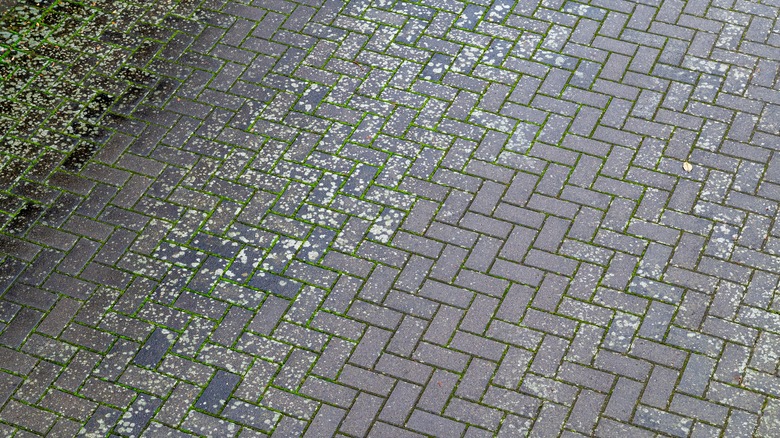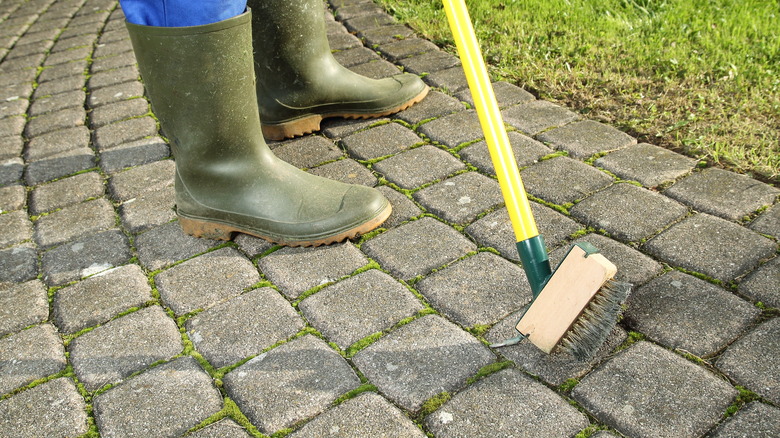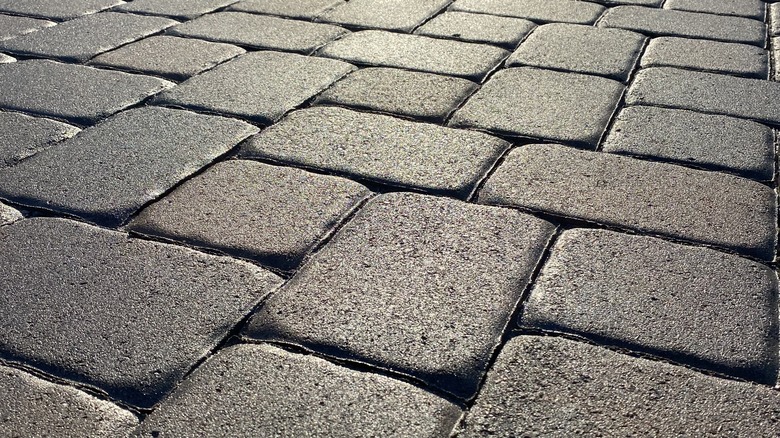The Household Essential That'll Leave Your Mossy Driveway Pavers Looking Like New
We may receive a commission on purchases made from links.
If your driveway pavers are overrun with moss, it's important to clean them before this plant causes damage. Even though moss adds a touch of rustic greenery, it commonly grows next to algae and lichen, two slippery substances when wet. This increases the odds of a slip-and-fall accident that can easily be avoided with a common household staple: hydrogen peroxide. There are many surprising ways to use hydrogen peroxide in your home, but most people don't think about applying it on their driveway. This eco-friendly moss remover is most likely already in your medicine cabinet and offers an inexpensive means of removing this plant safely and affordably.
But why use hydrogen peroxide? Why not just pull the moss up by hand? For starters, yanking moss can disturb the sand between your pavers, and you need this sand to keep your hardscaping in place. Additionally, spraying the moss and later brushing it away is infinitely easier than weeding. As soon as you spot signs of serious moss growth, it's time to mix up some hydrogen peroxide and water. Since moss acts like a sponge, its stored moisture can degrade pavers. The longer it sits, the more damage it causes to your driveway. And since the average paver driveway can cost as much as $30,000, you understand why it's best to tackle moss from the onset.
Spray and brush driveway pavers
You may know how to get rid of moss in your lawn, but how do you remove it from driveway pavers? The answer is simple: Grab a spray bottle and mix equal parts water and hydrogen peroxide. Standard 3% hydrogen peroxide is fine for this project. A spray bottle might not be ideal for large driveways or extensive patches of moss, however. As such, you should consider investing in a garden sprayer. You can purchase one at Harbor Freight Tools for just under $5. Once your solution is mixed, spray it anywhere you see moss on your driveway pavers. The goal is to saturate the moss. Once it's dried out, sweep it away using a soft bristle brush — such as this one on Amazon for $21.99 — and use it again and again to sweep your driveway, patio, walkway, deck, and more.
Another popular cleaning agent is vinegar, as it also works to kill moss. However, vinegar and hydrogen peroxide should never be mixed. Doing so creates peracetic acid, a toxin that irritates your eyes, throat, lungs, and skin. If you've recently cleaned your driveway pavers with vinegar, ensure it's been thoroughly rinsed off before applying hydrogen peroxide. The same goes for any other surfaces in and around your home.
Why does moss grow in driveways?
If your driveway receives a significant amount of shade, it's probably prone to moisture. This means it's also perfect for moss growth. Additionally, overhanging trees can lead to moss accumulation, so consider pruning them, allowing sunlight to reach your driveway. Whenever you see moss starting to form, grab your hydrogen peroxide, mix it with water, and clean your pavers.
But is this cleaning method eco-friendly? According to the EPA, hydrogen peroxide isn't known for causing harm to people or the planet when following its intended directions for use. As long as you dilute your hydrogen peroxide with water when cleaning your pavers, it shouldn't harm nearby plants, either. You may even find that it works to curb your local pest population while removing stubborn moss.
That being said, this substance is toxic to dogs and can lead to death in some instances. The best way to protect your beloved pet is by thoroughly rinsing this substance from all surfaces before letting your dog near areas where you sprayed. Otherwise, you risk your best friend's paws and skin experiencing irritation. They can also ingest some hydrogen peroxide if they lick their paws, so always be mindful when using chemicals around animals — and the same goes for children. Although hydrogen peroxide is touted as a green method of cleaning, it's important to note that it's still a manufactured chemical and should be treated as such.


